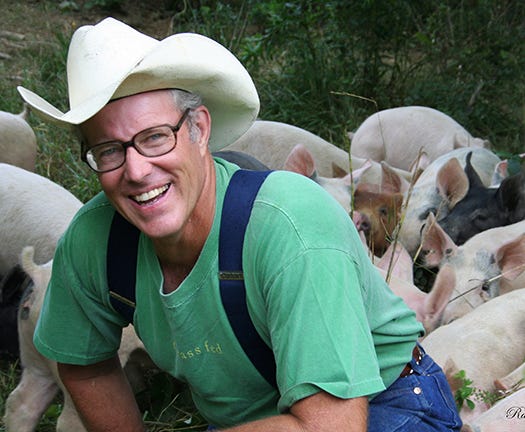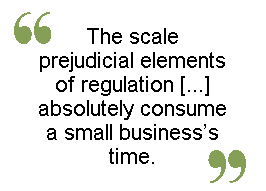For Joel Salatin, transparency trumps all the buzzwordsFor Joel Salatin, transparency trumps all the buzzwords
Outspoken alternative farmer Joel Salatin talks about what buzzwords matter and why it's so hard to be a food startup with integrity today.

 He’s a self-proclaimed “Christian-conservative-libertarian-environmentalist-lunatic farmer” with a passion for good farming—and good food—that’s undeniably contagious. Third-generation farmer Joel Salatin, who runs Polyface Farms in rural Virginia and was featured in Michael Pollan’s best-seller The Omnivore’s Dilemma and the documentary Food Inc., will surely be a highlight of Natural Products Expo East.
He’s a self-proclaimed “Christian-conservative-libertarian-environmentalist-lunatic farmer” with a passion for good farming—and good food—that’s undeniably contagious. Third-generation farmer Joel Salatin, who runs Polyface Farms in rural Virginia and was featured in Michael Pollan’s best-seller The Omnivore’s Dilemma and the documentary Food Inc., will surely be a highlight of Natural Products Expo East.
He recently spent some time with NFM reflecting on the current “integrity food tsunami” and the challenges of fighting an industrial system that thinks food is fundamentally mechanical rather than biological.
NFM: You’ve been farming for a long time. What’s most different about our food system now from 20 years ago?
Joel Salatin: I think both ends are accelerating. The industrial, mechanical, anti-life end is becoming more aggressive—think Monsanto. There’s new, absolutely damning evidence coming out every single day about what the industry does, whether it’s animal welfare or some new technology that makes us all scared. That is proliferating, and it’s driving the antithesis, which is an integrity food tsunami. There’s a veritable tidal wave of interest in all things food related among many more people than just 10 years ago. I often get up in the morning and pinch myself—like I was the old Cinderella in the ashes and suddenly I’m chic.
NFM: For a while it seemed that organic was the most important standard for this integrity food movement. Now there’s a lot of talk about what’s the next step beyond organic. What values or labels do you think we should be prioritizing?
JS: All of us in this business are trying to carve out our differentiation and start conversation. My message is transparency. In our new age of democratized information, we need to appreciate that it’s harder to hide things now because everybody’s got a camera, everybody’s on Twitter. Look at what’s happening in police departments right now with these real-time videos. I just keep moving back to transparency. How are you as a business? Do you really want it, or do you really not? Our culture right now is in a free fall of mistrust. As this realignment happens, how do we who say we’re trustworthy and want to be the new go-to trusted purveyors in our society actually take that new place of trust? I think all of these buzzwords are attempts, but they don’t get the nub of it. I think the nub of it is transparency.
NFM: What food and farming issues aren’t getting enough attention right now?
JS: Government oversight is always scale prejudicial. There’s all this intention for safety regulations, food regulations, dietary guidelines, organic standards—name your agency, name your legislation. But at the end of the day, when these are actually converted to boots on the ground, they’re always prejudicial against small operations. I think the untold story right now in this local food system is that there’d be a million more players at the table if we actually had, for example, a direct market or went to empirical testing instead of subjective paperwork. This is absolutely what drives the takeover of small businesses. When you add up all the scale-prejudicial elements of regulation such as getting insurance, passing GAP standards and ensuring animal welfare—filling out paperwork, getting certified—they absolutely consume a small business’s time. The larger the business, the easier it is to deal with all this.
NFM: Speaking of big businesses, when you hear about Chipotle eliminating GMOs or Hormel acquiring Applegate, do you think these companies are helping us move in the right direction?

Expo East appearance:
Keynote Speaker
Friday, September 18
9-10 a.m.
Room 308/309
Baltimore Convention Center
JS: I see those two as very different. I see Chipotle driving non-GMO as being extremely powerful and positive in the movement. To have an outfit of this size stepping out like this is gutsy and profound. Hormel acquiring Applegate is, in my opinion, the opposite end of the spectrum—acquisitions by companies that don’t share the same values. Historically, the acquired entity begins to compromise because the leadership and structure become corporatized and compromised. I’ve seen that in countless acquisitions. All these little organic companies get swallowed up by big players who do not share the same values, who think food is fundamentally mechanical and not biological, who think you have to grow in sales every year. There are lots of ways to grow besides just sales. Grow in better product sourcing, grow in transparency, grow in better ingredients. This whole industrial corporatization of these integrity food startups’ lofty, in some cases almost altruistic, values systems is quite disheartening.
NFM: What’s the biggest barrier to people paying more attention to how their food is produced?
JS: Convenience and apathy. The ubiquitous assumption that you can be disengaged about something as foundational as your body’s fuel and yet still have good fuel is simply foolish. Everybody wants me to tell them how to get the best food in the world on their table all of the time and not have to worry about GMOs or herbicides or whatever. They want me to snap my fingers and all of the sudden this will happen and they don’t have to change anything in their life. That’s simply not true. You have to read, become informed or at least become as interested in your body’s fuel as you are in the latest dysfunction in the Kardashian household.
About the Author
You May Also Like





